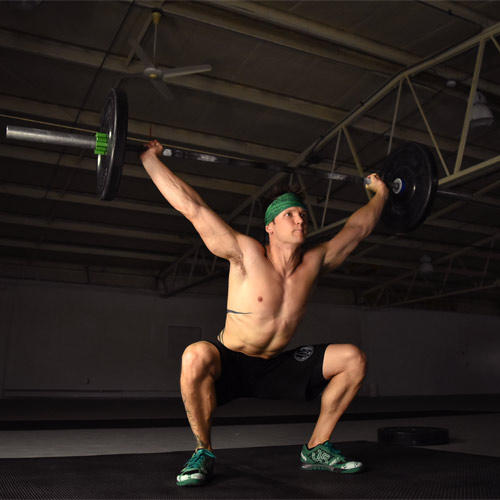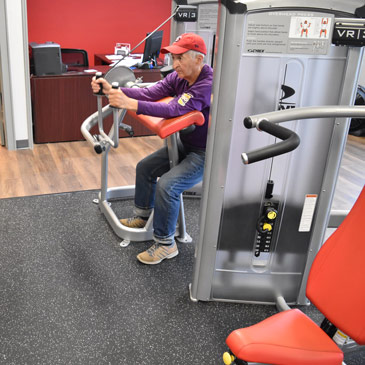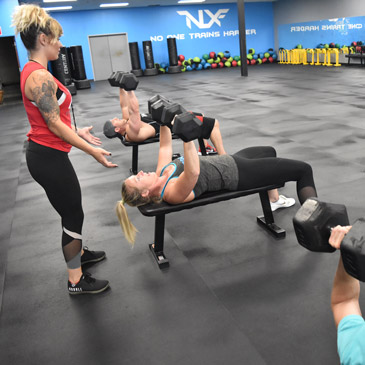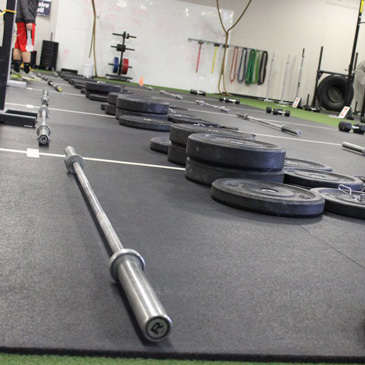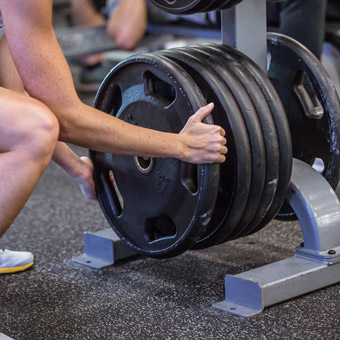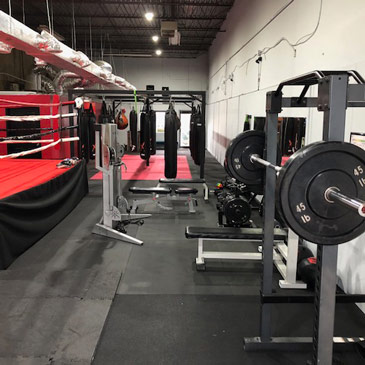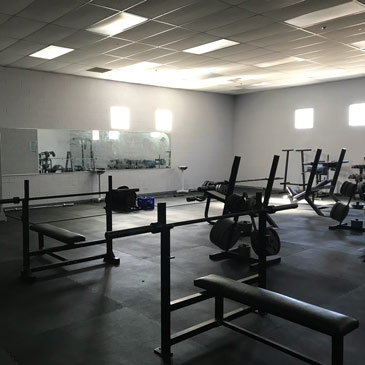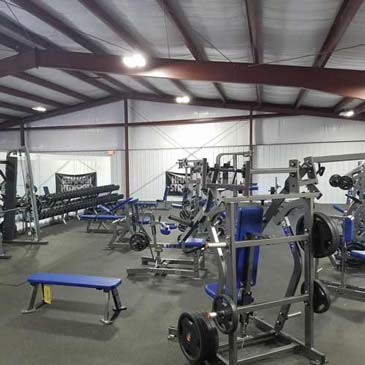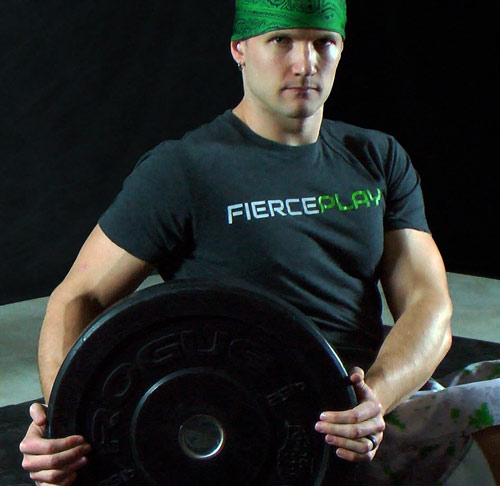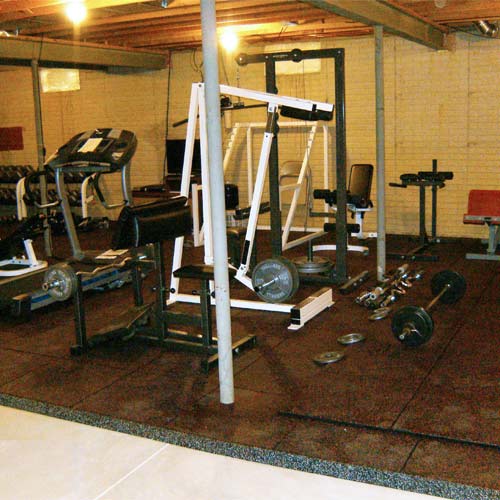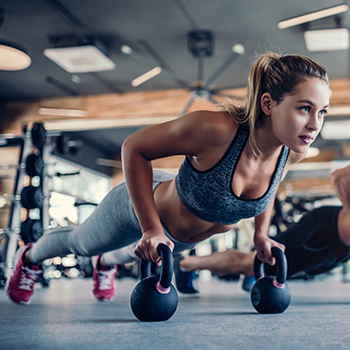Weight Lifting Mats for Resistance Training
Related Product: Impact Zone Lifting Platform Rubber Roll 14.5 mm x 4x25 Ft.
Greatmats carries a variety of weightlifting mats, including straight-edge mats, interlocking rubber mats and tiles, and rolled rubber gym flooring. In addition to the popular rubber products, we also carry PVC plastic, high-density foam, and athletic artificial turf flooring for gyms.
How To Choose the Right Weightlifting Mat
Most strength training facilities use rubber weightlifting and powerlifting mats for free weight and weight machine areas. However, the type of rubber gym flooring used will vary depending on the types of weight training exercises that the space is used for. A thin layer of rolled rubber is often sufficient for basic exercises that use body weight or lighter-weight dumbbells, kettlebells, or barbells. As the weights increase, then the thickness and protection provided by a powerlifting mat also need to increase.Rolled rubber is available in thicknesses up to ½ inch, so spaces that are used for heavier weights will need a thicker product. Straight-edge mats are available in thicknesses up to ¾ or 1 inch. These straight-edge mats hold up well to nearly all weight training styles, but they don’t always offer the best noise or vibration absorption. When you’re repeatedly dropping heavy weights, then a specially engineered support structure is really ideal. Rubber tile gym floors that are specifically engineered for weightlifting and noise reduction are capable of virtually eliminating the noise and vibrations of 225-pound barbells being dropped onto them.
If you’re looking for a flooring solution for a home gym where you’re working with existing carpeting, a raised PVC tile might be the right choice. These tiles interlock together easily and provide a durable, solid surface. Greatmats offers several options that work well for home gyms.
Foam weight room flooring is another popular choice suitable for mid- to lightweight free weights and weight machines. While these foam tiles are highly durable, they’re not designed for withstanding the impacts of intentionally dropped weights.
How To Install Weightlifting Mats
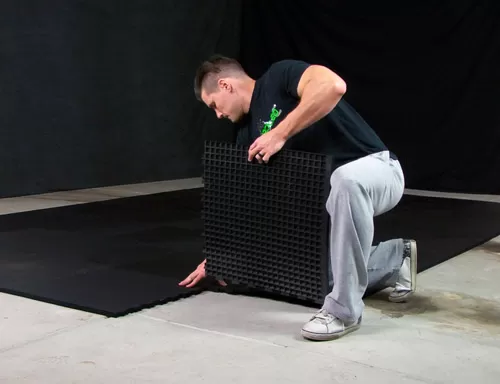 It’s also important to consider the installation of any mats and flooring products. Rolled rubber is ideal for covering larger spaces, but the rolls - especially of larger thicknesses - can be heavy and cumbersome, so you’ll need multiple people to help with the installation.
It’s also important to consider the installation of any mats and flooring products. Rolled rubber is ideal for covering larger spaces, but the rolls - especially of larger thicknesses - can be heavy and cumbersome, so you’ll need multiple people to help with the installation.
Rubber tiles can be much easier to install. Greatmats offers a wide array of interlocking rubber tiles that are sized to be easy to carry and install. They fit together tightly, so they won’t separate during use. These tiles result in less wasted material than rubber rolls, and they don’t require adhesive for installation. If a tile is worn or damaged, you can replace that one tile rather than replacing an entire section of flooring. This can save you money while keeping your floor in great condition.
Rubber mats are larger than tiles, and they typically feature straight edges. They can be dry laid on top of existing flooring. The mats can be heavy, but that weight also helps to keep them securely in place during use.
How Thick Should Weightlifting Mats Be?
Put simply, your weightlifting mat needs to be thick enough to protect your subfloor from the impact of the weights and the wear and tear of your weightlifting equipment. That thickness can vary and will depend on the types of weights that you commonly lift.Rubber weight training mats are available in multiple thicknesses, and each is suitable for different amounts of weight and different activities:
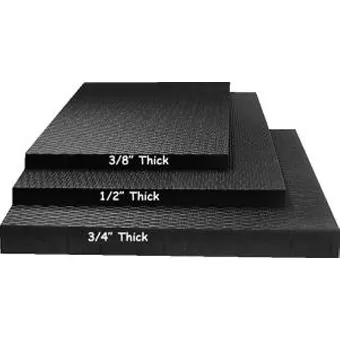
- ¼-inch rubber rolls are appropriate for lighter handheld weights
- ½-inch rubber weight training mats are suitable for weights over 100 pounds
- ¾-inch lifting mats are necessary for intentionally dropping free weights
- 1-inch mats are suitable for almost any type of weights
What Material Is Best for Powerlifting Flooring?
A rubber powerlifting mat is the preferred type of powerlifting flooring for multiple reasons. Rubber is highly durable and strong, and thick rubber can withstand the concussion of heavy dropped weights. Rubber also helps to absorb the shock of the weights, protecting your subfloor.From a practical standpoint, rubber is economical, so it’s suitable for both professional gyms and home gyms. Vulcanized rubber is waterproof, making it easy to clean up.
What Is The Difference Between Powerlifting and Weightlifting?
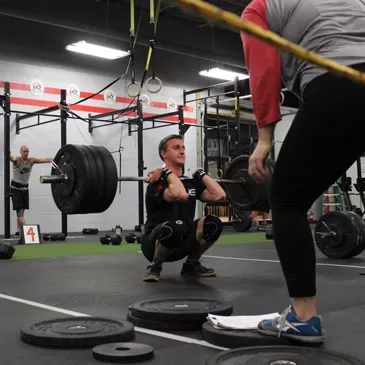 Both powerlifting and Olympic weightlifting involve lifting and dropping significant weight onto your floor, so they require quality lifting mats. But there are also a few key differences between the sports. Olympic weightlifting consists of two lifts - the snatch and the clean and jerk. Powerlifting involves three lifts - the squat, bench press, and deadlift. During a competition, you can attempt each lift three times, and your best three lifts contribute to your total. Weight lifting is often used as a generalized term for all forms of strength or resistance training where the practitioner lifts items of various weights for the purpose of building muscle.
Both powerlifting and Olympic weightlifting involve lifting and dropping significant weight onto your floor, so they require quality lifting mats. But there are also a few key differences between the sports. Olympic weightlifting consists of two lifts - the snatch and the clean and jerk. Powerlifting involves three lifts - the squat, bench press, and deadlift. During a competition, you can attempt each lift three times, and your best three lifts contribute to your total. Weight lifting is often used as a generalized term for all forms of strength or resistance training where the practitioner lifts items of various weights for the purpose of building muscle. 